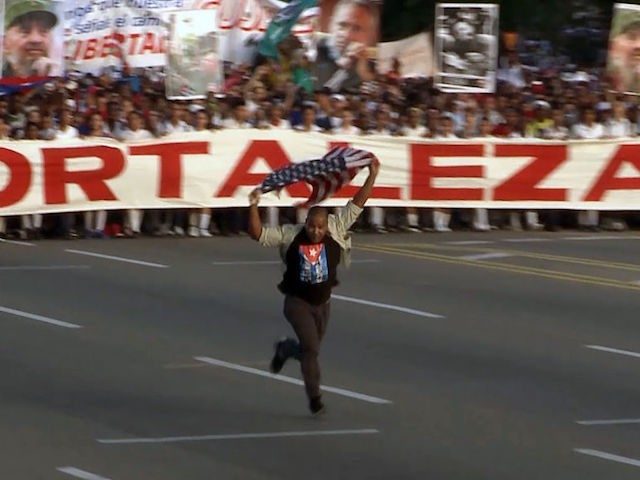Daniel Llorente, a Cuban dissident who made international headlines after interrupting the island’s May Day parade waving a U.S. flag, has begun a hunger strike in the Havana mental ward where the government imprisoned him following the patriotic display.
Llorente was beaten publicly and detained following his run through the streets of Havana waving the American flag, a blatant display of contempt for the communist regime.
Finding no grounds on which to keep him in prison and bowing to international pressure following his arrest, the Cuban government imprisoned him in a mental institution, commonly known as “Mazorra,” on the grounds that Llorente, according to his son, expressed belief in God.
The younger Llorente, Eliécer, told the Miami-based Martí Noticias that his father began a hunger strike Tuesday after being kept in isolation and denied the right to see the sun. In a statement to Martí, his son called for the international community to pressure the regime to stop violating Llorente’s rights to freedom.
In another interview shortly before announcing his hunger strike, Eliécer Llorente told Martí that he had delivered a letter written by his father to the U.S. consulate in Havana, addressed to President Donald Trump and Sen. Marco Rubio (R-FL), and that doctors at the mental institution have not provided any evidence of mental illness in his father’s case.
President Trump, with Sen. Rubio in tow, announced a new policy towards Cuba last week designed to cut revenue streams to the Cuban military, which controls much of the island’s tourism business and is mainly responsible for the violence and oppression against dissidents.
The policy prevents Americans from traveling to Cuba on “individual people to people” trips, which were largely used by the wealthy to engage in illegal tourism on the island. Cuban Americans seeking to visit family are not affected by the new policies.
“He says they have not let him see the sun since he arrived there,” his son told Martí. “He is stuck in his cell all day. Now they have heightened security, they took away his telephone and identification. There used to only be one guard for him, but now there are four, five, six.”
Cuba keeps an estimated 140 prisoners of conscience behind bars following convictions for disrespecting the communist regime. The Castro regime denies their existence and keeps that number low by making liberal use of arbitrary political arrests. Nearly 10,000 of these occurred in 2016, a modern high following President Barack Obama’s “normalization” policy taking effect.
Cuba beats and arrests dissidents, often on a weekly basis, only to free them or place them on house arrest before beating and arresting them again in short order.
With Llorente, the Cuban regime appeared to be testing out a new form of tricking human rights groups into thinking the number of political prisoners is lower than it actually is by keeping prisoners in mental institutions and claiming they are not deprived of their liberties for political reasons.
Shortly before the Cuban government took away his phone, Llorente gave an interview to the Cuban outlet 14 y medio, where he said a doctor explicitly told him there was no way to confirm any mental illness.
“I don’t understand why I am here,” he said. “The doctor told me that, in order to say something definitive about my case, I would have to be here at least two months because, according to her, that is what the law says.”
“They say that since he believes in God and is always talking about that … they say that is a disorder,” Llorente’s son told Martí following his transfer to the institution.
Llorente is not a member of any Cuban dissident group, instead acting independently to assert his support for the United States and its values over those of the Castro regime. Llorente previously waved his American flag to greet the Adonia, the first American cruise ship to visit Havana since the Revolution.
“I use whatever flag I want because I am free,” he said at the time.

COMMENTS
Please let us know if you're having issues with commenting.